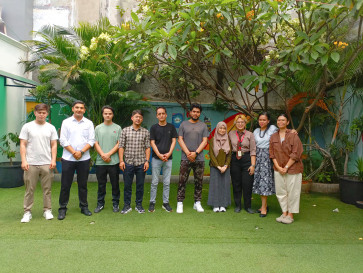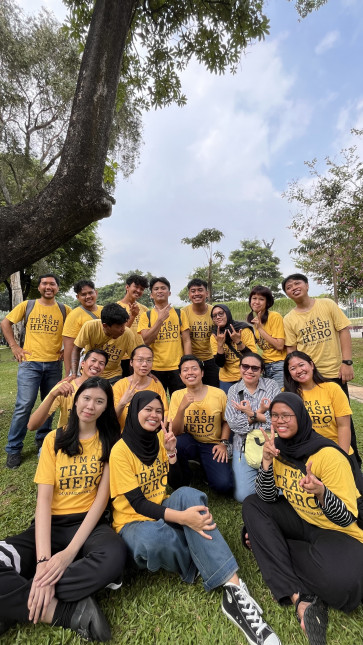Shutterstock
Last month, as I opened the Gojek app to order a ride home, I was greeted by an unexpected treat: A personalized report summarizing my behavior on the platform throughout 2024.
Much like Spotify’s Wrapped, Gojek’s Kilas Balik (Flashback), nicknamed “Kejog”, presented an eye-opening snapshot of my digital habits: From food deliveries and transport fares to drivers’ tips.
Spoiler alert: I spent way more than I thought.
Apparently, I wasn’t alone. According to Google’s e-Conomy Southeast Asia 2024 report, Indonesia’s digital economy surged last year. Gross Merchandise Value (GMV) rose 13 percent, hitting Rp 1.47 quadrillion (US$90 billion), up from 2023’s Rp 1.3 quadrillion.
Similarly, the Trade Ministry reported an 11.9 percent increase in e-commerce users, from 56.63 million in 2023 to 65.65 million in 2024.
With rising prices and increased e-commerce adoption, this spending growth isn’t surprising. But it did leave me wondering: Are we, as consumers, aware of just how much more we’re spending online? And more importantly, are we happy with it?

Thank you!
For signing up to our newsletter.
Please check your email for your newsletter subscription.
Where did our money go?
To get some answers, we conducted an informal online survey earlier this month, which gathered 71 responses.
Unsurprisingly, food deliveries and dining out were where most people’s disposable income went. Leisure activities, such as movies, traveling and other outings, came second, followed by hobby items like books, memorabilia and sports equipment. Clothing and accessories ranked fourth, with beauty products rounding out the list.
Interestingly, online shopping seems to have reshaped how people spend.
Some 63 percent of respondents said discounts significantly influenced their decisions, with 65 percent choosing platforms offering the best deals.
This aligns with public data: Tokopedia’s 11.11 promo boosted sales by 26 times the daily average, while Shopee’s 12.12 Birthday Sale saw seven times the usual sales.
Google’s report also revealed that shoppers in 2024 made purchases eight times more often than a decade ago, with nearly 70 percent of e-commerce growth driven by existing users.
Not only are there more e-commerce users in Indonesia, but existing users are also shopping more frequently.
"I went off-budget on panic-buying bags. I didn't even like some of them." - Anonymous
Are shoppers happy?
While many respondents admitted to spending more during sales, their reactions were mixed.
“I need to spend less time on Shopee or Tokopedia during sale periods,” one respondent confessed, pointing to impulse purchases as a concern.
Another shared, “I went off-budget on panic-buying bags. I didn’t even like some of them.”
Despite this, only 4.3 percent regretted their purchases. Nearly half, or 47.8 percent, felt satisfied with their discounted buys, while 8.7 percent were indifferent.
More than half said they appreciated the convenience of shopping online, which made price comparisons easy and helped them track expenses better.
Still, about a third of respondents felt e-commerce did more harm than good to their finances.
“No need for me to go out and experience traffic jams, saves me time,” one shared.
“It’s a bit of both. I can monitor my spending and get notified when prices have dropped. But it makes me browse [and sometimes buy] things I might not even like just because it's on sale,” said another.
Are we spending smarter?
Despite having tools to track purchases, our survey suggests awareness doesn’t always translate to better spending habits.
Some 61 percent said they were conscious of their increased spending in 2024, but only 26 percent followed a strict budget, and just 36 percent actively tracked their expenses.
“[Being] unable to control impulsive spending led me to use my sundry savings that otherwise could've been used to add to my main savings,” shared one respondent.
Some said they spent more “than planned on gifts [and others] that are very expensive”, with “a lot on eating out, compared with 2023”, and pointed to having “weddings to attend, or unexpected expenses and family and friends’ events”.
One respondent shared they did “quite a lot of unplanned spending, especially during the holidays”. This might be an excuse many of us can relate to.
When asked if they thought they spent wisely last year, only a handful said yes. Most admitted they could’ve done better.
Looking ahead
As we step into 2025, many respondents are determined to change their habits.
About 70 percent said they plan to avoid repeating their 2024 spending patterns. Some aim to redirect funds from smaller, frivolous purchases toward more significant investments.
"I will think for a week before buying anything," one regretful respondent said.
Another said, “I plan on redirecting the money I budgeted for monthly frivolous purchases into a separate account, which would then be used for an annual single big-ticket purchase.”
Maybe staring at the cold, hard numbers of our digital spending does have its benefits.
So, what’s your plan for 2025? Will you stick to a budget and curb those impulse buys, or embrace more mindful spending and keep chasing the thrill of a great deal? Either way, it’s a fresh start and the choice is yours.
Aqraa Sagir is a writer for The Jakarta Post's Creative Desk. He’s chronically online in the hope it would be a useful asset for the job.























